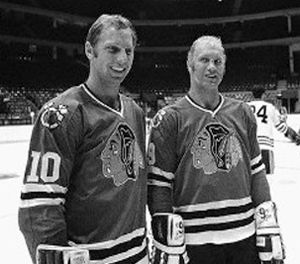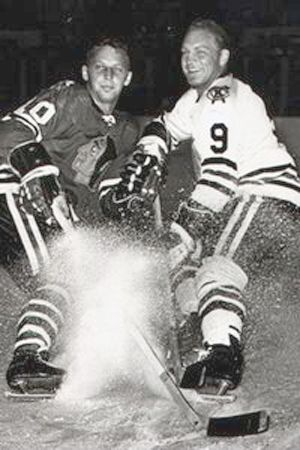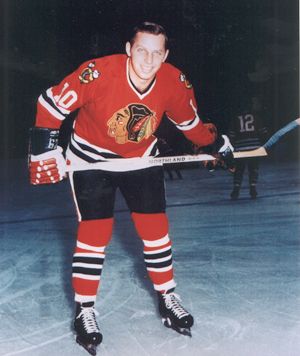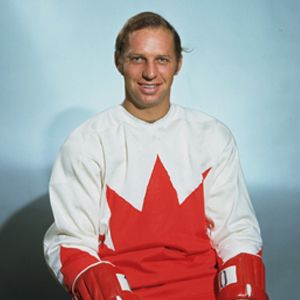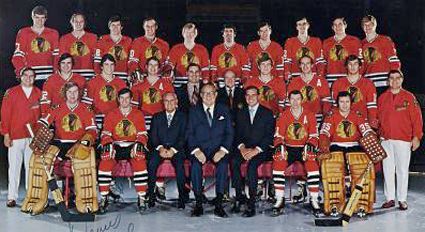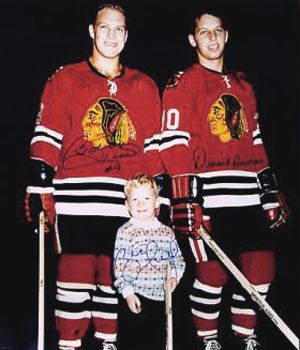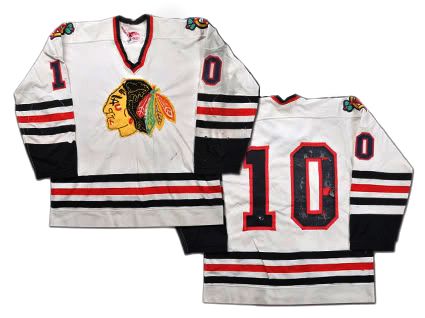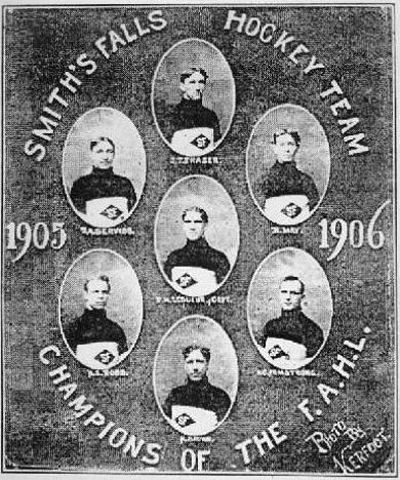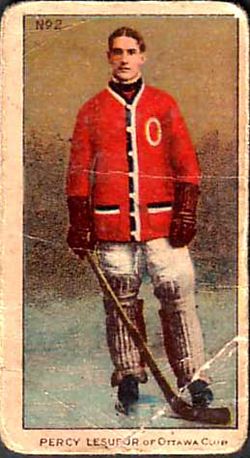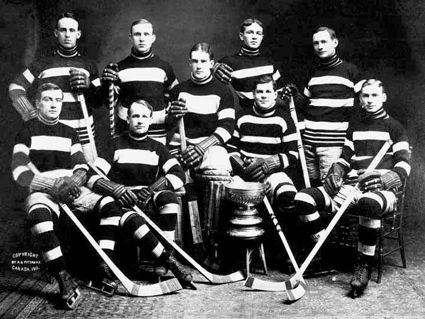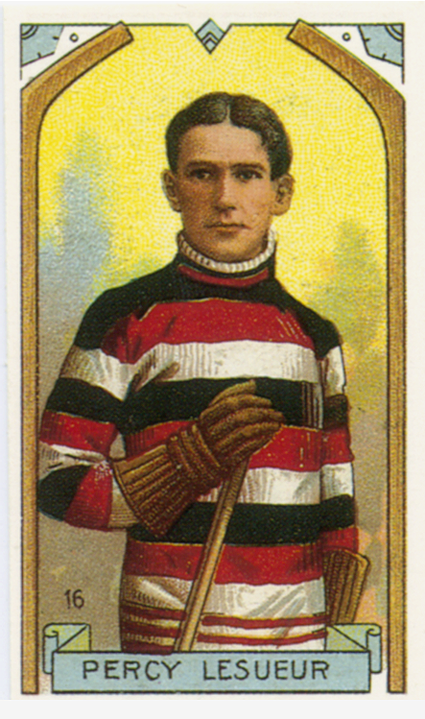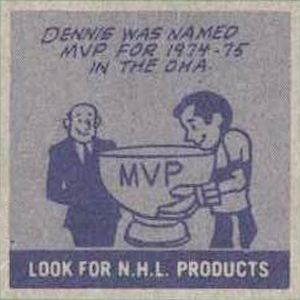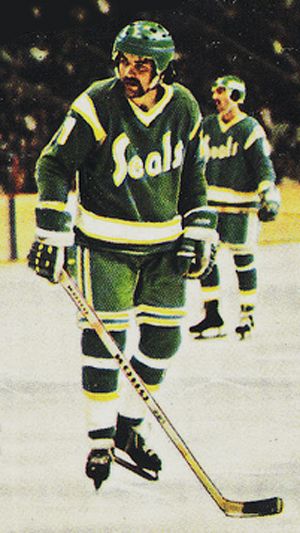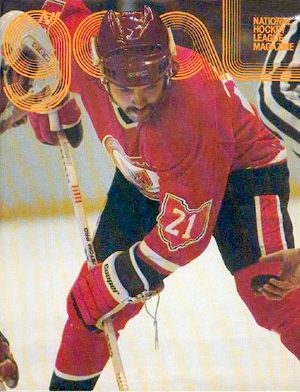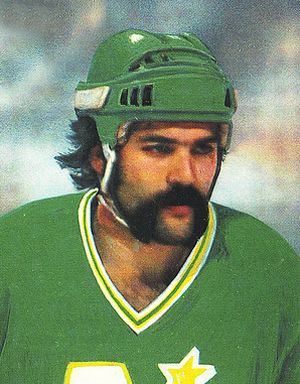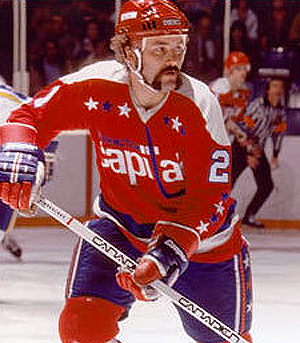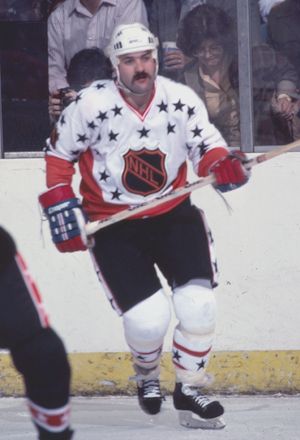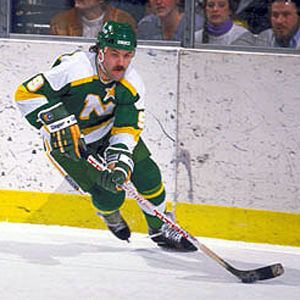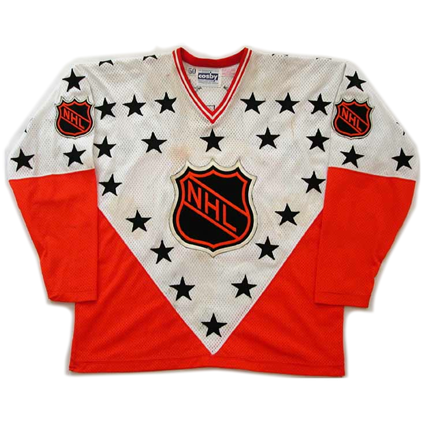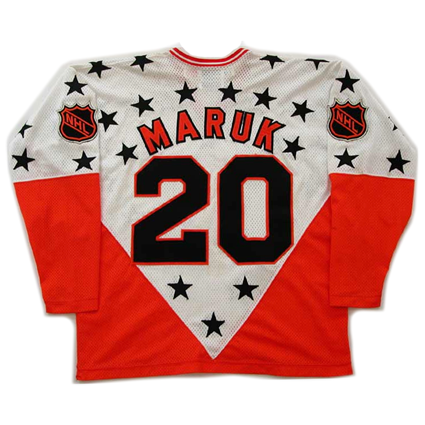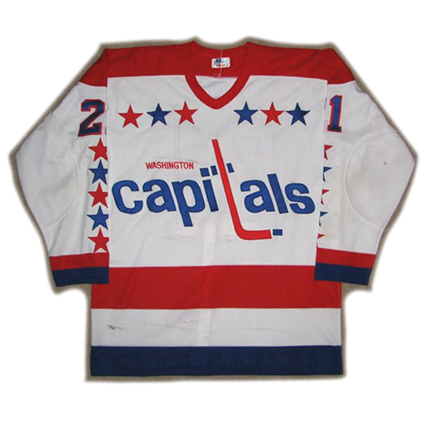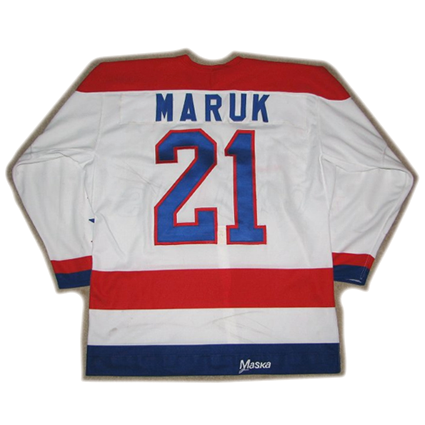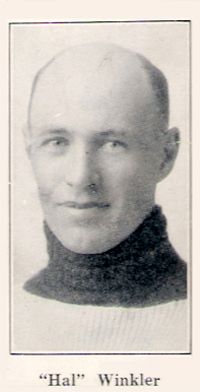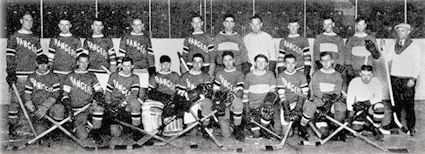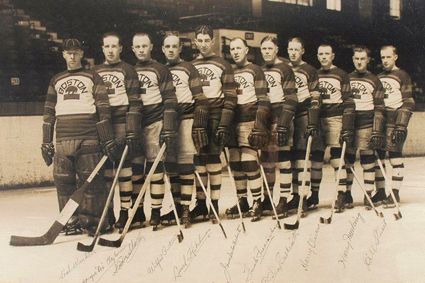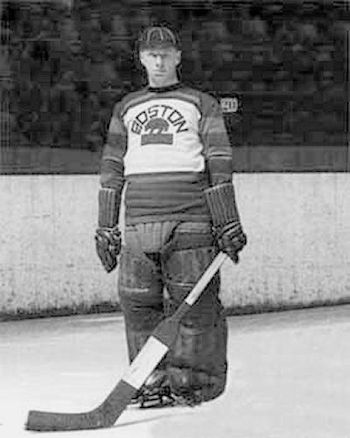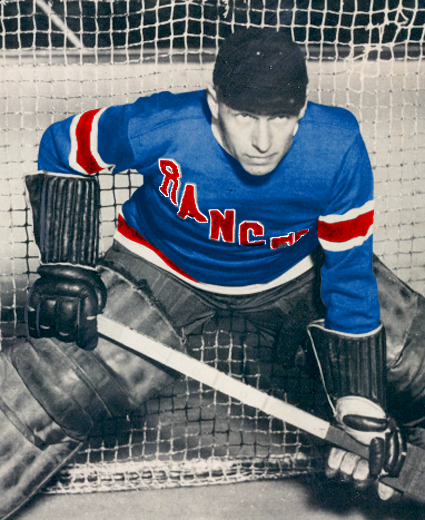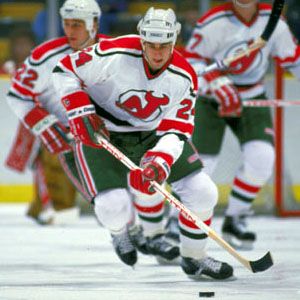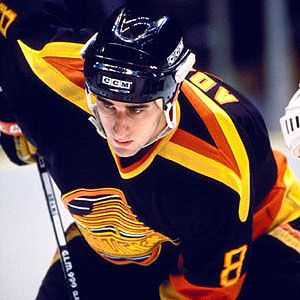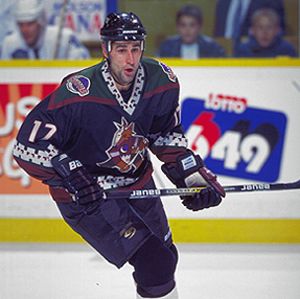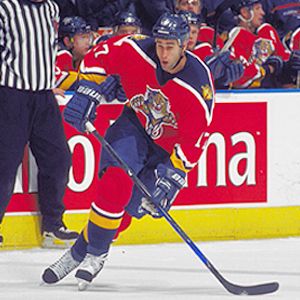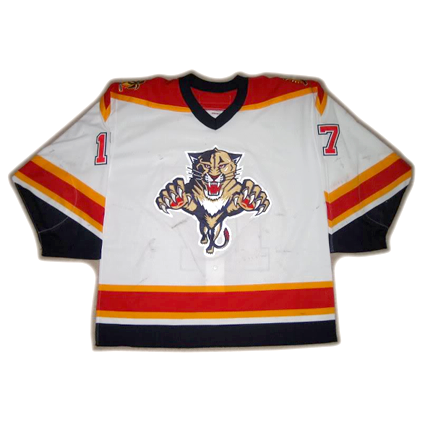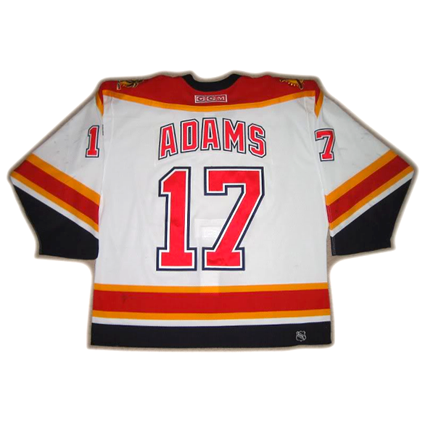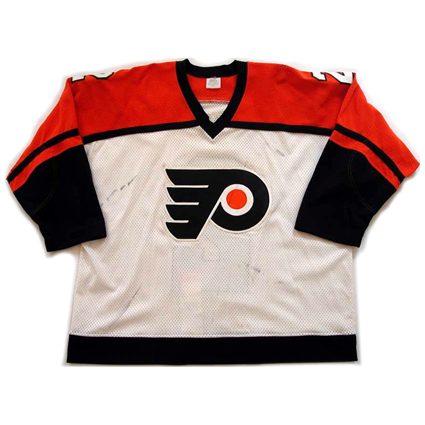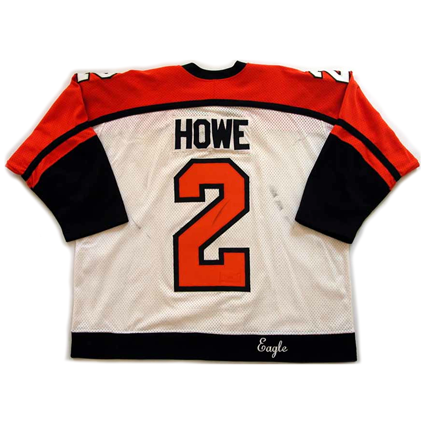Saturday, November 19, 2011
1972-73 Chicago Black Hawks Dennis Hull Jersey
Playing his career in the shadow of his older brother and teammate Bobby Hull, Dennis Hull was born on this date in 1944.
Dennis and Bobby Hull
Hull played junior hockey with the St. Catharines Teepees of the Ontario Hockey League beginning in the 1960-61 season and gave no indication of what was to follow with two seasons of 10 and 18 points. The team became sponsored by the Chicago Black Hawks in 1962 and thus became the St. Catharines Black Hawks. In 1962-63 Hull raised his point total to 48 before impressing the following season with 48 goals and 97 points, doubling his total from the previous season.
He made the Chicago roster in 1964-65 and saw action in 55 games, scoring 10 goals as a rookie. The club determined he needed some additional seasoning in 1965-66, and Hull was sent to the minors for 40 games with the St. Louis Braves. He also played 25 games with Chicago that season, but his lone goal raised cause for concern.
Those fears were calmed in 1966-67 when he played in all 70 games, scoring 25 goals and 42 points. Two seasons later Hull registered his first 30 goal season. The only problem for Dennis was that Bobby was in his 12th season for the Black Hawks, had ten seasons of 30 goals or more and scored an NHL record 58 goals that same season. Such was life for Dennis Hull in the NHL.
Dennis had a very good 1970-71 season, setting a career high in goals with 40 and nearly catching Bobby, who had 44 while now having been paired with Pit Martin and Jim Pappin on the "MPH Line", which came from the trio's last initials. The team also excelled, making a playoff run that would take them to the first Stanley Cup Finals in Dennis' career.
For their final season as teammates, Dennis had his third 30 goal season and set a new personal best with 69 points. For 1972-73, the hockey world was turned on it's ear with the arrival of the World Hockey Association, who made Bobby their marquee attraction by signing him away from the Black Hawks by virtue of a million dollar contract.
This defection resulted in Bobby being blacklisted from the Team Canada roster for the 1972 Summit Series against the Soviet Union, despite his undoubted offensive capabilities. Dennis though, was still a member of the NHL and became part of Team Canada, at the urging of his brother following Dennis' thoughts of boycotting the series in support of Bobby. Dennis was paired with New York Ranger teammates Jean Ratelle and Rod Gilbert, and scored two goals and four points in the four games he played in.
With the 50 goal scorer Bobby now out of the lineup, everyone feared what the impact would be on the Black Hawks, but the MPH Line stepped up to fill the void, and all three players hitting at least 90 points and raising their previous season total by a minimum of 21 which saw Dennis Hull score 39 goals and set a career high with 90 points. That season, Chicago would again return to the Stanley Cup Finals for the second time in Hull's career.
The 1972-73 Chicago Blackhawks
In 1973-74, Hull would play in 74 games, his eighth consecutive season of 70 games or more, a streak broken the following season when he played in "just" 69 games. He followed that with playing 80 and then 75 in his final two seasons with the Black Hawks. In all, he would play 824 games out of a possible 848 games once he established himself as a regular with the club 11 seasons earlier, a rate of 97% for the model of reliability and consistency he, and the MPH Line, provided the Black Hawks.
Hull was acquired by the Detroit Red Wings for the 1977-78 season, his final one before retiring as a player.
His final NHL totals are 959 games played with 3030 goals and 351 assists for 654 points and he would appear in six NHL All-Star Games, including the 1974 version with linemates Martin and Pappin.
Known for his outgoing personality and sense of humor, he wrote a book entitled (in reference to his nephew and Bobby's offensively gifted son Brett Hull) "The Third Best Hull - I would have been fourth best but they wouldn't let my sister Maxine play."
Bobby, Brett and Dennis Hull
Today's featured jersey is a 1972-73 Chicago Black Hawks Dennis Hull jersey as worn during Hull's career year when he played for Team Canada in the 1972 Summit Series and then went on to the best season of his NHL career with 90 points.
The Black Hawks adopted this jersey style in 1955 and it has become an icon in the world of hockey, remaining essentially unchanged for over 55 years.
Today's video section begins with highlights of the MPH Line in action.
Hull has gone on to a career as a public and motivational speaker, and here he is telling some of his humorous stories.
Here are highlights of Game 6 of the 1972 Summit Series, in which Hulls scores a goal for Team Canada.
Finally, a pair of intertwined interviews from WGN TV in Chicago, hosted by long time Cubs announcer Jack Brickhouse. Bobby clearly got the better background for his interview...
Labels:
Chicago Blackhawks,
Hull Dennis
Friday, November 18, 2011
1910-11 Ottawa Senators Percy LeSueur Jersey
Born on this date in 1881, Percy LeSueur, played amateur hockey in his hometown of Quebec City before the right winger relocating to Smith Falls, Ontario to play for the Smiths Falls Seniors, where he switched to playing in goal, beginning with the 1903-04 season.
He went 3-3 in his fist season and for the 1905-06 season Smith Falls joined the Federal Amateur Hockey League and dominated the competition on their way to a perfect 7-0 record, which earned Smiths Falls the right to challenge the Ottawa Silver Seven for the Stanley Cup. While Ottawa would win the best-of-three series 2 games to none, LeSueur so impressed the Senators with his play, that a week later, with Ottawa having been blown out in the first game of their two-game, total-goals series against the Montreal Wanderers by a score of 9-1, the Silver Seven turned to LeSueur as a replacement for Billy Hauge.
LeSueur accepted the offer and his debut with the Silver Seven was one of the most memorable games in hockey history and perhaps the greatest game ever up to that point, as Ottawa gave up and early goal to increase their deficit to 9 goals before they came roaring back with nine consecutive goals to even the series at 10-10. However, Lester Patrick scored two late goals for the Wanderers to not only spoil the Ottawa comeback but also end their three year stranglehold on the Stanley Cup.
Despite the loss, LeSueur became a full time member of the Silver Seven beginning with the 1906-07 season and would remain so through a series of evolving leagues the club were members of, beginning with the Eastern Canada Amateur Hockey Association. He was second in the league in goals against that season.
During the next ECAHA season, LeSueur was the lone Ottawa representative in the first hockey All-Star game, which was a benefit for the late Hod Stuart. During the regular season, LeSueur was again second in goals against average while repeating his 7-3 won-loss record.
The league shortened it's name to the ECHA for the 1908-09 season during which Ottawa finished in first place with a 10-2 mark as LeSueur once more finished runner-up in the goals against statistic. As league champions, Ottawa was granted possession of the Stanley Cup, having supplanted the previous champion Montreal Wanderers.
As was frequently the case in the formative years of professional hockey, the Silver Seven joined a new league for the 1909-10 season, the Canadian Hockey Association. Before the regular season began, Ottawa defended a challenge for their cup from a team from Galt, Ontario. who they defeated 15 goals to 4 over the two game series. Once the regular season began, the new league was an instant failure, which caused Ottawa to withdraw from the league after playing just two games. They then joined the rival National Hockey Association and went 9-3 to place second behind the rival Wanderers. While Ottawa had defended the cup once more during the NHA season against the Edmonton Hockey Club in late January, possession of the cup passed to Montreal by virtue of their having won the regular season title over Ottawa. With the regular season record from two leagues combined, as well as the Stanley Cup challenge games, LeSueur finished the season with a 15-3 record.
LeSueur was named team captain for the 1910-11 season and Ottawa then stormed the league, powering to a 13-3 record with 122 goals in 16 games, while no other team finished with a record above .500 or 91 goals. LeSueur returned to his customary position with the second best goals against average in the league and, as league champions, Ottawa regained possession of the Stanley Cup, which led to a pair of challenges in March of 1911, which they successfully turned away with a 7-4 win over Galt and a 13-4 thrashing of the Port Arthur Bearcats. They were to be the last Stanley Cup games for LeSueur with Ottawa and he finished with a perfect 7-0 mark in challenge games for the club.
1910-11 Ottawa Senators - holders of the Stanley Cup
LeSueur is in the center of the photo holding his goalie stick and wearing the leg pads
LeSueur would play three more seasons for the club, by now known as the Ottawa Senators. Additionally, the now veteran LeSueur also coached the team in 1913-14 in addition to maintaining his captain's duties.
With Ottawa having now found a new, younger goaltender to take over their duties in the form of future Hall of Famer Clint Benedict, LeSueur was traded to the Toronto Shamrocks for the 1914-15 season during which he went 8-11. For his final season in hockey, he and the other Shamrocks players were transferred to the Toronto Blueshirts, also owned by Eddie Livingstone. The Blueshirts performed very much the same as the Shamrocks, with LeSueur posting a 9-13 record.
After retiring as a player, LeSueur remained very active in hockey, at times being a referee, manager, arena manager, journalist, broadcaster and coach in both the minor leagues as well as the NHL. Additionally, he is credited with creating the first gauntlet style goalies glove, which evolved from his experimenting with gloves used in baseball. He also designed and patented the first goal net used by the NHL.
LeSueur was inducted into the Hockey Hall of Fame in 1961.
Today's featured jersey is a 1910-11 Ottawa Senators Percy LeSueur jersey with the Senators trademark black, red and white horizontal "barberpole" stripes. This style of jersey was first adopted in 1904, and except for one season with vertical stripes in 1910-11, remained in use through the original Senators final season in Ottawa of 1933-34, with the addition of the letter "O" crest from 1929-30 on.
Labels:
LeSueur Percy,
Ottawa Senators
Thursday, November 17, 2011
1982 NHL All-Star Dennis Maruk Jersey
Born on this date in 1955, Dennis Maruk caught the attention of NHL scouts while playing junior hockey for the London Knights of the Ontario Hockey Association. As a rookie, Maruk scored 46 goals and 113 points in 1972-73 to break Marcel Dionne's league rookie scoring record , led the club in scoring the next season with 47 goals and 112 points before finishing third overall with 66 goals and 145 points in 65 games, an average of a goal every game and 2.23 points every time he took the ice.
Following that season Maruk was selected 21st in the second round by the California Golden Seals of the NHL as well as being taken 65th overall by the Cleveland Crusaders of the WHA, his relatively low draft positions being due to his smaller size, as Maruk was 5' 8" and 165 pounds. He chose to sign with California and immediately stepped into the Golden Seals lineup, playing all 80 games of the 1975-76 season. He would score 30 goals finish second in team scoring, just one back of Al MacAdam with 62 points.
That would prove to be the troubled Golden Seals final season in Oakland, and the club relocated to Cleveland, Ohio where they were renamed the Barons for the 1976-77 season. He led the Barons in scoring with 78 points their first season in Cleveland and again in 1977-78 with 36 goals and 71 points, 20 more than his next closest teammate which earned him his first NHL All-Star appearance.
For the 1978-79 season, the lowly Barons were merged with the even worse Minnesota North Stars, resulting in Maruk's third club in four seasons despite never having been traded or waived!
Often overlooked, Maruk had one of the finest mustaches in NHL history
Despite his obvious offensive talents, Minnesota would deal Maruk to the Washington Capitals after just two games in the green and gold, a decision Maruk would make Minnesota regret.
Maruk immediately led the Capitals in scoring with a 31 goal 90 point season. Torn knee ligaments ruined his 1979-80 season, limiting him to just 27 games after not playing less than 76 in any previous season.
He returned healthy and with a vengeance, playing all 80 games for the next three consecutive seasons while scoring 50 goals for the first time in 1980-81, good for eight in the league.
The 1981-82 season was a career year for Maruk, as he again led the Capitals in scoring with 60 goals (third in the league) and 76 assists for 136 points, which was fourth overall. His efforts were recognized with his second NHL All-Star Game appearance. Despite his career statistical highs, the Capitals and Maruk missed the playoffs yet again. Maruk's 76 assists and 136 points remain the Captials team records to this day.
While his personal scoring declined to 31 goals and 81 points, the Capitals qualified for the postseason for the first time in their history. It would also be the first time Maruk would participate in a playoff game in his now eight year career.
Maruk was not to be a part of the Capitals future however, as perhaps wishing they had been the benefactors of his 50 and 60 goal seasons, the North Stars reacquired Maruk for the 1983-84 season. A combination of getting older and the North Star style of play limited Maruk's offensive output, and Maruk would never again approach his electrifying point totals from his days in Washington.
His first four seasons in Minnesota were a model of consistency, as he would play in 71, 71 and 70 games, scoring 60, 60 and 58 points. One tradeoff for the lower scoring totals was that Minnesota qualified for the playoffs all three seasons, including a run to the semifinals in 1984.
Injuries began to take their toll on the normally healthy Maruk, and a separated shoulder and torn knee ligaments cut his 1986-87 season to 67 games and 46 points. The following season was more of the same, as he missed the start of the schedule with a lacerated tendon and sara his season end early with a shattered knee cap. He would see the ice for just 22 games that season.
The surgery required on his knee would affect his 1988-89 season, and he would eventually play just 5 games in the minors and 6 with the North Stars before retiring from the NHL for good.
Maruk's final career totals are 888 games played, 356 goals and 522 assists for 878 points.
Outside of his NHL career, Maruk also participated in the World Championships for Canada on four occasions, in 1978 winning a bronze medal, 1979, 1981 and 1983 when he brought home a second bronze.
Today's featured jersey is a 1982 NHL All-Star Game Dennis Maruk jersey. This gaudy one year only style is the most absurd of all the 1980's All-Star jerseys with it's excessive number of stars, proving quite visually that less is sometimes more.
Apparently the design team did not get the word that the disco era had ended. In addition to having far too many stars, the NHL logos on the arms would have been better served by being on the shoulders to leave room for sleeve numbers.
Fortunately sanity would prevail and the next ten years would see some of the best jerseys in the history of the All-Star Game.
Bonus jersey: Today's bonus jersey is a 1981-82 Washington Capitals Dennis Maruk jersey, proving by comparison that less stars can be more effective.
This jersey was worn during Maruk's 60 goal season and can be distinguished by the Maska logo on the back, which was closer to the side of the jersey in previous years. Additionally, the word Washington on the front is much smaller than it was in 1979-80.
Today's video segment begins with a tribute to Maruk on the occasion of his entering the Etobicoke Sports Hall of Fame in 2004.
Speaking of gaudy jerseys, here is some rare footage of Maruk while wearing Canada's loudest design ever at the 1978 World Championships against the Soviet Union.
Looking great, but sans mustache, Maruk is interviewed at the 2009 Canadian Pond Hockey Championships.
Labels:
Maruk Dennis,
NHL All-Star Game,
Washington Capitals
Wednesday, November 16, 2011
1926-27 New York Rangers Hal Winkler Jersey
Goaltender Hal Winkler began is hockey playing days in Winnipeg with a series of senior clubs from 1913 to 1918, concluding with a challenge for the Allan Cup. He subsequently played for the Brandon Elks, Moose Jaw Maple Leafs and Saskatoon Crescents over the next three seasons prior to being sold to the Edmonton Eskimos of the brand new Western Canada Hockey League for the 1921-22 season.
He would play three seasons for the Eskimos with a 36-27-5 record, finishing with the best regular season record twice and winning the league playoff title in 1923. For the 1924-25 season, Winkler was sold to the Calgary Tigers and immediately finished with the league's best record once again. After a second season with Calgary, Winkler moved east as the NHL was in a period of expansion.
Winkler's 1923 Paulin's Candy trading card
Tex Rickard, president of New York's Madison Square Garden, saw the success of his tenants the New York Americans during their first season in 1925-26, and wanted to maximize the use of his arena by having a second team play there. He was granted a franchise for the 1926-27 season, which was quickly referred to as "Tex's Rangers".
The 1926-27 New York Rangers first training camp.
Note the white lettering on the sweaters.
One of the players obtained to stock the Rangers new lineup was Winkler, who was named the starting goaltender for the Rangers first ever game on this date in 1926. Their opponents that night were the Montreal Maroons, who Winkler shutout 1-0 thanks to a goal by Bill Cook, making Winkler the first goaltender in NHL history to record a shutout in his first game.
After playing eight games for the Rangers, Winkler was dealt to the Boston Bruins for $5,000 in mid-January and went 12-9-2 for the Bruins before leading them to the Stanley Cup Finals in the postseason as the Bruins ousted the Chicago Black Hawks in a total-goals series 10-5 and eliminated the Rangers 3 goals to 1.
Winkler leads the Bruins lineup into the 1927 Stanley Cup Finals
He played a career high 44 games with Boston in 1927-28, also setting a career best with 20 wins, which included a stunning 15 shutouts on his way to a 1.51 goals against average.
Despite having played every game in goal for Boston and finishing with the the third best wins and goal against average plus leading the league in shutouts, Winkler found himself in the minor leagues with the Minneapolis Millers for the 1928-29 American Hockey Association season. There, he posted a fine 17-7-10 record.
Winkler moved to the west coast for the 1929-30 season when he joined the Seattle Eskimos of the Pacific Coast Hockey League. After one season with Seattle, it was back to Boston for Winkler to finish out his career, this time with the Boston Tigers of the Canadian-American Hockey League.
Today's featured jersey is a 1926-27 New York Rangers Hal Winkler jersey. While researching this entry we believed that the original Rangers sweaters had white lettering, changing to red for the 1927-28 season before adopting red letters with white outlines from 1928-29 on. However... we found several team photos and player photos attributed to the 1926-27 season, including the below photo of Winkler, which had to be from 1926-27, as he only played eight total games for the Rangers, clearly with red letters with white outlines two seasons before we believed they were first used.
Perhaps the white only jerseys were used in training camp and were replaced with the jersey shown below for the regular season. Either way, we're confident that the below photo of Winkler is from the Rangers inaugural season leaving us with a mystery to solve.
Today's video selection is a look at the history of the New York Rangers, which includes their founding in 1926.
Labels:
New York Rangers,
Winkler Hal
Tuesday, November 15, 2011
2000-01 Florida Panthers Greg Adams Jersey
Greg Adams began his road to the NHL with the Kelowna Buckaroos of the British Columbia Junior Hockey League during the 1980-81 season. The left winger got off to a great start, scoring 40 goals and 90 points in 48 games at the age of 17. After a second season with Kelowna, Adams definitely took the road less traveled when he joined the little known, little regarded, little remembered hockey program at Northern Arizona University.
Northern Arizona fielded a Division 1 team from 1980-81 to 1985-86, the first five as an independent club. During his first season with the Lumberjacks, Adams scored at more than a point per game with 35 points in 29 games, but erupted in 1983-84 with 44 goals and 73 points to lead not only Northern Arizona, but the entire nation in scoring.
Still, after that performance, Adams went undrafted by the NHL and signed as a free agent with the New Jersey Devils. He spilt his first professional season between the Maine Mariners of the AHL (41 games and 11 playoff games) and the Devils (36 games). During only his second NHL season, and his first full season, Adams set a career best with 77 points in 78 games. His point total sank in year three to 47 in 1986-87.
That drop in points made Adams expendable and he was dealt to the Vancouver Canucks along with goaltender Kirk McLean. The change in scenery worked well for Adams who went on to play eight seasons in Vancouver, including four goals in his first game as a Canuck. His first season with the Canucks saw him set a career high with 36 goals while coming within one of his career best with 76 points, just one off the team lead.
While with Vancouver he would post three more 50 point seasons as well as scoring one of the greatest goals in team history with his overtime goal in Game 5 of the 1994 Western Conference Finals to propel the Canucks to the Stanley Cup Finals after they had trailed by three goals at one point. During that season's playoffs, Adams would score 14 points in 23 games, including the game winning goal in overtime of Game 1 of the finals.
After 31 games of the 1994-95 season, he would be traded to the Dallas Stars. Three seasons with Dallas saw Adams have two 20 goal seasons, the 8th and 9th of his career. Still, he never played more than 66 games for Dallas due to a series of injuries which limited his playing time.
For the 1998-99 season Adams moved to the Phoenix Coyotes as a free agent, where he once again had a good first season with his new team, seeing action in 75 games. He played a second season with Phoenix where his 46 points were the most he had scored since 1993 with Vancouver.
For the 2000-01 season, Adams joined the Florida Panthers as a free agent. He would play in 60 games that year, which included his 1,000th career game on this date in 2000. He would celebrate the occasion by scoring the Panthers first goal of the game in a 4-1 win over the Carolina Hurricanes as he became the only player from Northern Arizona University to ever play 1,000 games in the NHL, as he was actually one of only two players from NAU to even make it to the NHL, the other being Bob Beers.
After sitting out the 2001-02 season, Adams tried his hand at hockey in Europe, signing with the Frankfurt Lions of the German DEL where he would score 42 points in 50 games to close out his career once and for all.
His final NHL totals are 1,056 games played, 355 goals and 388 assists for 743 points.
Today's featured jersey is a 2000-01 Florida Panthers Greg Adams jersey. This is from the second era of the Panthers jerseys, as their original jerseys worn from 1993-1998 had one color red names before changing to three color vertically arched names on the back in time for the 1998-99 season. This style would remain in use through the 2005-06 season before the arching was removed and the three color names became straight once again in 2006-07 for a single season prior to the change to new jerseys with the arrival of the Reebok Edge jerseys the following season.
Today's video segment begins with Adams overtime goal against the Maple Leafs to send Vancouver to the Stanley Cup Finals in 1994.
Here, Adams scores the game winning goal in overtime of Game 1 of the finals just after the Rangers hit the crossbar at the other end.
Labels:
Adams Greg,
Florida Panthers
Monday, November 14, 2011
The 2011 Hockey Hall of Fame Induction Ceremony
Tonight is the 2011 Hockey Hall of Fame Induction Ceremony for this year's inductees, Ed Belfour, Doug Gilmour, Mark Howe and Joe Nieuwendyk, and outstanding class of excellent players.
Here then is our tribute to the Hockey Hall of Fame Class of 2011.
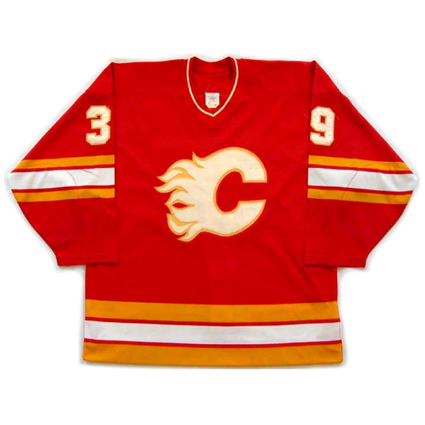
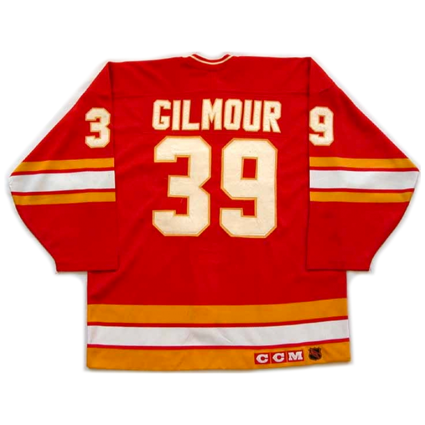
≈
Holds the NHL record for Fastest Two Shorthanded Goals at 4 seconds
≈
The 2011 Hockey Hall of Fame Induction Ceremony will be broadcast live on TSN 2 in Canada and the NHL Network in the United States starting at 7:30 PM Eastern time tonight.
Labels:
Belfour Ed,
Gilmour Doug,
Hockey Hall of Fame,
Howe Mark,
Nieuwendyk Joe
Sunday, November 13, 2011
Subscribe to:
Comments (Atom)

